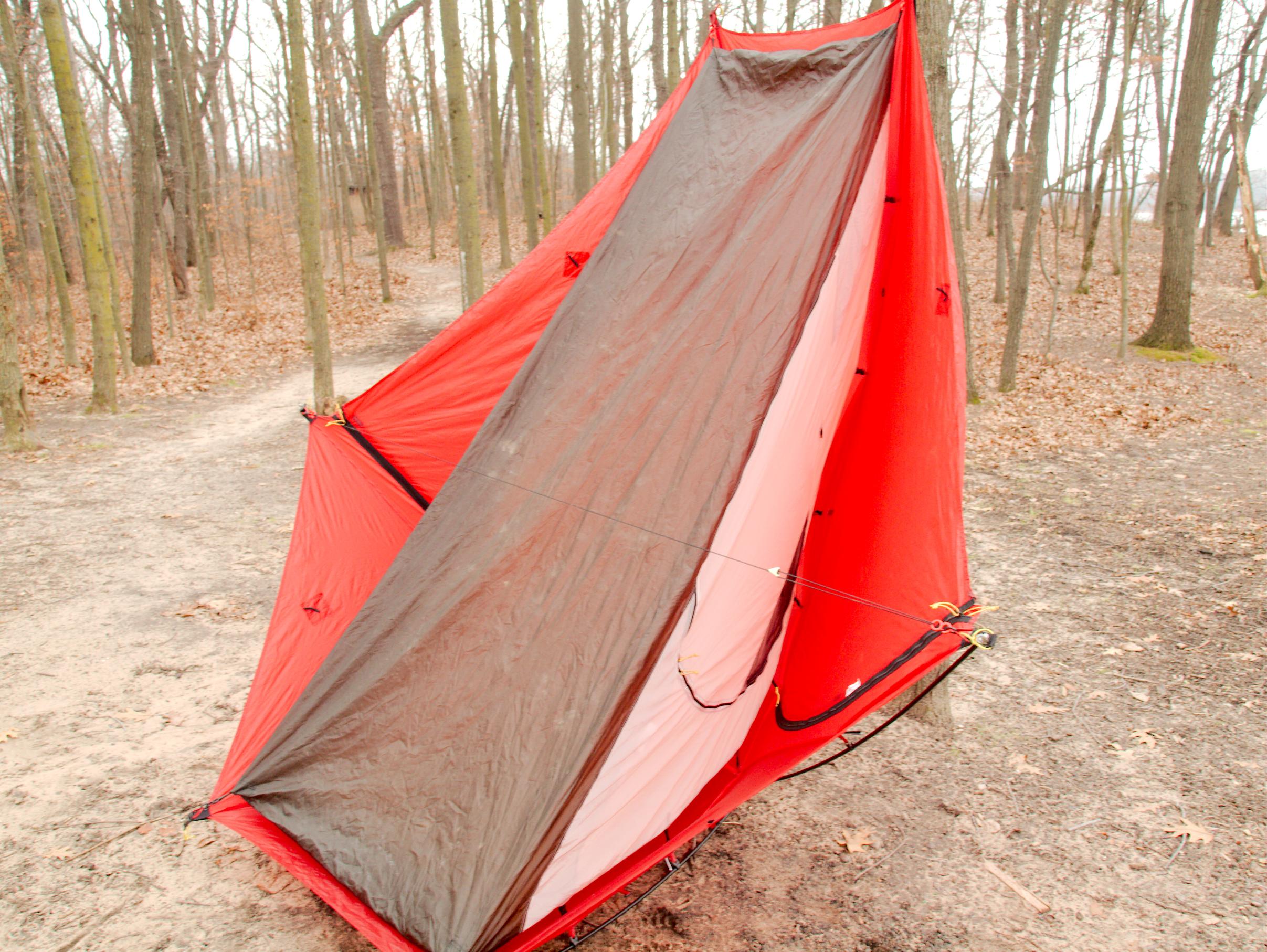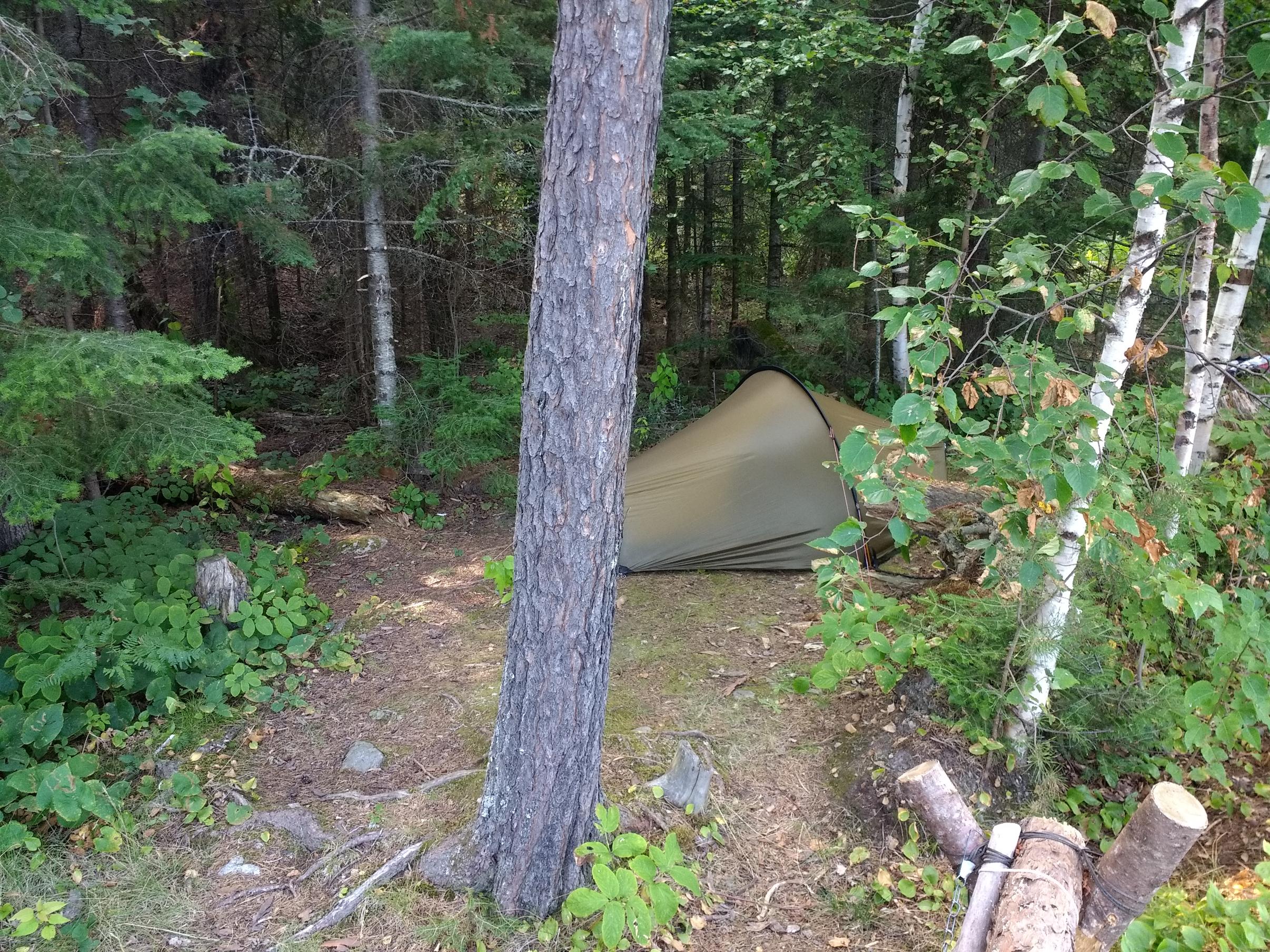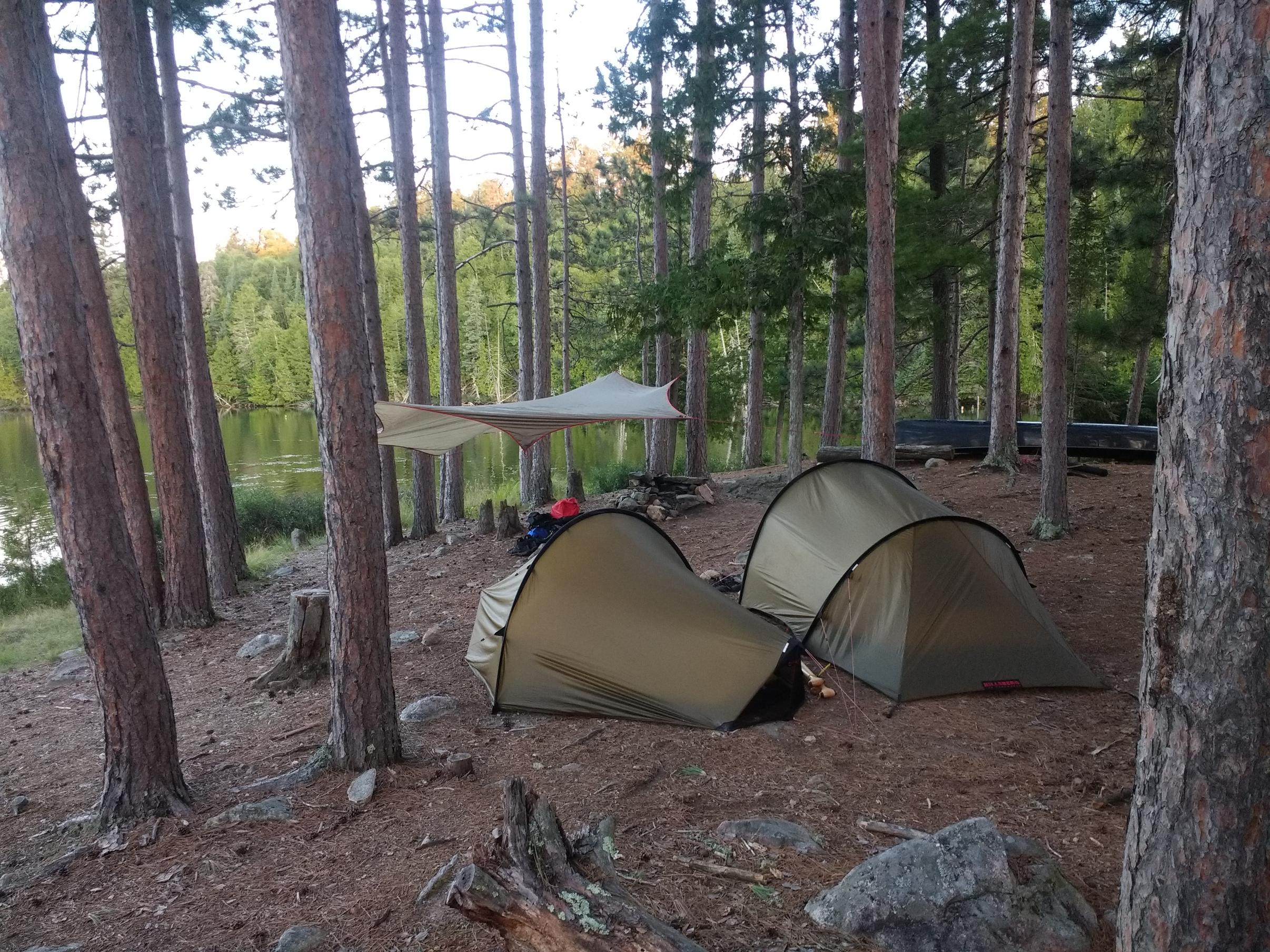| Author |
Message Text |
|
Northwoodsman
|
Last week I purchased some Big Agnes Blowdown Tent Anchors from Big Agnes. They are currently on sale for 50% off. I have experienced what you are worried about when using my CCS Leans. Granted you could make something very easy and cheap, but sourcing and purchasing these took only about 1 minute of my time. They weigh 1.5 oz. each. At the same time I ordered another insulated pad for cheap. Don't forget to use the code "HAPPYCAMPER" for free shipping.
Big Agnes Blowdown Tent Anchors
|
|
butthead
|
 Even freestanding need some help sometimes. Spent a lot of time inside a CCS Lean that needed a pile-O-stakes so freestanding is not necessary. Now my most used shelter is fully freestanding even the vestibules are frame anchored. A BSI Chinook Even freestanding need some help sometimes. Spent a lot of time inside a CCS Lean that needed a pile-O-stakes so freestanding is not necessary. Now my most used shelter is fully freestanding even the vestibules are frame anchored. A BSI Chinook 
High speed Chinook setup. Put it up move it where it fits best.
butthead
|
|
MikeinMpls
|
Big fan of free-standing tents. That way I don't have to worry about finding tie-downs. I know others haven't had a problem, but if I can avoid the issue, why not? With a free-standing tent, I can orientate the tent as I wish so I can get the view I want. Not always possible if tie downs are required.
Mike
|
|
Tomcat
|
I prefer small free standing tents and shelters but they are not necessary. Free standing shelters must also be secured for windy conditions. Thin titanium stakes and stake out loop extentions have proven helpful for me. When all else failes I tie off to rocks or logs.
There is always a way just have a plan and prepare your equipment.
|
|
Ausable
|
There is a wide variability in camp sites. Be prepared to tie off to rocks, logs, etc and then rejoice when you can use only stakes!
|
|
A1t2o
|
You could always add a length of cord to find softer ground or trees to tie to. You don't have to only work with the limited lengths they give you.
|
|
andym
|
We have the biggest tarptent and have always managed to make it work. Those BA anchors look like they could be handy. Tying rope around a big rock can be tricky. Overall, I have no urge to go back to a freestanding tent.
|
|
HappyHuskies
|
I think you'll be fine with your silnylon tent. I generally use a Zpacks Hexamid that also requires quite a few (8-10) stakes and I've always been able to get it pitched. As others have mentioned, you may have to get a little creative at some sites, but it's always doable.
|
|
Gmagnes
|
Planning first visit to BWCA this summer. How likely is it that some or most camping sites will be so rocky or have so thin soil cover due to being on the edge of the Canadian Shield, that it will be difficult to pitch anything but a free standing tent? I have a very light weight silnylon tent that requires at least 6 stakes to be pitched properly. How likely is it that I’ll need to use rocks etc to pitch this tent rather than be able to anchor the stakes
In the ground?
Thanks
Gerry
|
|
walllee
|
Even when I can get all the stakes in the ground I always try to secure it further by tying off to trees, roots, logs, or rocks. I have seen winds they have taken tents on long rides. Never can have to many tie downs.
|
|
butthead
|
Some free standing tents can be quite light. My BA Platinum FlyCreek UL is 2 ponds 3.8 ounces a 2 person with the ground cloth included, fastfly pitched it's 1 pound 14.  the BSI Chinook 3 pounds 12 ounces in it heaviest configuration and as light as just under 2 pounds in it's lightest (it's a modular component solo tent). the BSI Chinook 3 pounds 12 ounces in it heaviest configuration and as light as just under 2 pounds in it's lightest (it's a modular component solo tent).
butthead
|
|
andym
|
MikeinMpls: "Big fan of free-standing tents. ... why not?"
The primary answer is weight. Non-freestanding tents can be significantly lighter.
A secondary answer is that the way tarptents are designed you can pitch and strike them without exposing the inner tent to rain. That's harder to do when the inner is held up with the freestanding frame and then the fly goes over that.
But freestanding can be nice too. Knowing that it isn't necessary allows us to make the choices that fit our needs.
|
|
MikeinMpls
|
andym: "MikeinMpls: "Big fan of free-standing tents. ... why not?"
The primary answer is weight. Non-freestanding tents can be significantly lighter.
A secondary answer is that the way tarptents are designed you can pitch and strike them without exposing the inner tent to rain. That's harder to do when the inner is held up with the freestanding frame and then the fly goes over that.
But freestanding can be nice too. Knowing that it isn't necessary allows us to make the choices that fit our needs."
Weight isn't that much of an issue to me, though I concede it may be to some. I've had free-standing tents my entire canoeing life. For many years we used Eureka Timberlines, which tended to be heavy. We now use the REI Quarter Dome T3 which is very light. I'll trade the weight for the ability to set it up without having to worry about finding trees and rocks for tie-down purposes.
Yes, free-standing tents benefit from ties to stretch out the fly, doors, vestibules, etc. However, those ties are not required for the tent to be functional or to be set up.
Mike
|
|
walllee
|
Even when I can get all the stakes in the ground I always try to secure it further by tying off to trees, roots, logs, or rocks. I have seen winds they have taken tents on long rides. Never can have to many tie downs.
|
|
minnmike
|
On my solos I use a non free standing and have always figured a way to make the tent work. Some sites are more challenging than others, may have to use a few rocks, roots or logs to make it work.
|
|
TominMpls
|
For years I worried about this and always brought self-supported (not truly freestanding, as the vestibules need stakes) tents. Then a couple years ago I bought a Hilleberg Enan, and honestly it hasn't been an issue. I've had a few instances where I had to search a bit to find an acceptable spot and I did pass on one campsite once but in the ~30 sites I've pitched that tent in those two years, I've always gotten it properly set up.
In this first picture you can't really tell but I had a lot of trouble finding a place where I could drive the stakes, I ended up in a little bit of a dip but the skies were clear so I didn't worry much. Also, that horrible woodcraft disaster in the foreground was left by a previous camper; I tore it down shortly after this photo and scattered its parts in the woods.

In this photo in Quetico the ground was so rocky that we ended up pitching our two (non-freestanding) tents in the only area where we could reliably drive our stakes, which meant they were right next to each other. Not ideal, but it worked.

|
|
EddyTurn
|
Even free-standing tent shall be staked out - or one day you might find it in the middle of the lake. If the ground is too rocky one can use loose rocks to tie down the stakes (make sure all tie-down loops are long enough to go around/under a heavy rock). If there are no loose rocks use those from the fire place.
|
|
sns
|
Another user of a small, non-freestanding tent here - same as the others, always have found a way to make it work.
|
|
Tomcat
|
PineKnot: "A nice advantage of a free standing tent is the ability to move it without taking it apart (except for the stakes)....on several occasions, I've had to move my tent due to too much incline or didn't realize rain water would pool under the tent...."
+1
The speed and ease of set up and take down plus convenience of moving locations is a big atvantage. My free standing screen shelter can be easily relocated. Sometimes I want to avoid late day sun or have a better view of the fire or lake so I relocate.
|
|
boonie
|
I use a small non-freestanding tent and have rarely found it necessary to do much out of the ordinary. Occasionally a rock or root, but usually I can hammer them (MSR Groundhogs) in with a rock. Gloves are useful for that ;).
|
|
Blatz
|
boonie: "I use a small non-freestanding tent and have rarely found it necessary to do much out of the ordinary. Occasionally a rock or root, but usually I can hammer them (MSR Groundhogs) in with a rock. Gloves are useful for that ;). " Same here, just poke around a bit and you'll find a spot for you're stake. Sometimes you won't get the stake all the way in the ground, but good enough.
|
|
PineKnot
|
A nice advantage of a free standing tent is the ability to move it without taking it apart (except for the stakes)....on several occasions, I've had to move my tent due to too much incline or didn't realize rain water would pool under the tent....
|
 Even freestanding need some help sometimes. Spent a lot of time inside a CCS Lean that needed a pile-O-stakes so freestanding is not necessary. Now my most used shelter is fully freestanding even the vestibules are frame anchored. A BSI Chinook
Even freestanding need some help sometimes. Spent a lot of time inside a CCS Lean that needed a pile-O-stakes so freestanding is not necessary. Now my most used shelter is fully freestanding even the vestibules are frame anchored. A BSI Chinook 
 the BSI Chinook 3 pounds 12 ounces in it heaviest configuration and as light as just under 2 pounds in it's lightest (it's a modular component solo tent).
the BSI Chinook 3 pounds 12 ounces in it heaviest configuration and as light as just under 2 pounds in it's lightest (it's a modular component solo tent).
